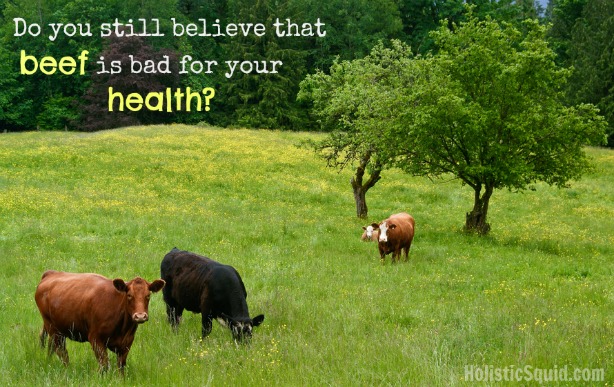
It doesn't matter to me if you eat beef, but I want to clear up some confusion for those who DO eat red meat and worry they shouldn't or DON'T eat red meat but wish they could.
Beef Myth #1: Beef is bad for your health
IT DEPENDS…Beef is often automatically thrown in the junk food category, and many health-conscious folks piously claim they don't “eat red meat” to avoid heart disease and cancer. The fact is, when the pros and cons of beef are up for discussion, it is essential to differentiate between conventional factory-produced beef and beef which is traditionally pasture-raised.
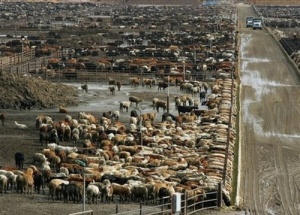 Conventional beef is all wrong. I'm tempted not to go into details here hence you lose your appetite, but gosh darn it, you just need to know. CAFOs (Concentrated Animal Feeding Operations) or IFAP (Industrial Farm Animal Production) are the factories that grow 99% of meat in America. Ninety-nine percent!
Conventional beef is all wrong. I'm tempted not to go into details here hence you lose your appetite, but gosh darn it, you just need to know. CAFOs (Concentrated Animal Feeding Operations) or IFAP (Industrial Farm Animal Production) are the factories that grow 99% of meat in America. Ninety-nine percent!
Cows are herbivores, designed by nature to eat grass and clover; but CAFOs cattle are fed genetically modified corn.
Cows eating corn is a bit like humans eating Lucky Charms – for every meal. Not good. Improper diet tends to create health problems for the cows, so they are often given antibiotics as a routine measure. They are crowded into grass-less bits of land – so you have unhealthy, stressed-out cows, standing in their own poo.
Because of their crappy diet and poor conditions, when they are processed, the meat needs to be uniformly decontaminated, so it is sprayed with ammonia. No, this is not an exaggeration.
So besides the obvious pairing with potatoes fried in rancid vegetable oil, your Big Mac certainly has plenty of reasons to contribute to heart disease, cancer, and other ailments. With 99% of meat coming from this type of operation, it is no wonder beef has such a bad reputation!
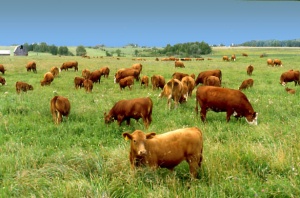 On the other hand, good quality beef – from pastured-raised cows – is a nutrient-dense, health-promoting food containing no antibiotics or hormones. It's a great source of saturated fat and cholesterol your body needs to function properly.
On the other hand, good quality beef – from pastured-raised cows – is a nutrient-dense, health-promoting food containing no antibiotics or hormones. It's a great source of saturated fat and cholesterol your body needs to function properly.
By the way, the modern epidemic of heart disease should not be blamed on grass-fed beef, bacon, butter, and cream, but on unhealthy vegetable fats such as margarine, canola, corn, and soy oils as well as the groceries' aisles of other processed foods.
If you're not convinced that saturated fat and cholesterol are good for you, read my posts on butter and bacon.
Grass-fed beef also contains more CLA (conjugated linoleic acid) which supports the immune system and may help fight cancer; omega fatty acids, and vitamin E. Both the omega-3 fats and CLA in grass-fed beef actually reduce the risk of heart disease.
One concern that's valid regardless of where your beef comes from is the temperature that you use to cook it. Broiling, grilling, or blackening at high temperatures can cause carcinogens to form on any foods (including veggies), so the best cooking methods are slow, low stewing or baking, or lightly grilling to medium rare.
Beef Myth #2: You can get sick from beef
IT DEPENDS…
E. coli and other pathogen levels are high in CAFO cattle because improper diet makes their stomachs more hospitable to E. coli (Journal of Dairy Science). Many people cook their meat extra well-done as a measure to kill any harmful bacteria.
My vote: Don't buy sick meat in the first place.
BOTTOM LINE: Healthy (grass-fed) cows make healthy meat.
Beef Myth #3: Cattle farming is bad for the environment
CAFO are horrible for the environment. Factory farmed beef contributes to the earth's ozone depletion largely because the feed factory cows eat requires such a large amount of energy to grow, harvest, and deliver. The soil it is grown on is depleted of nutrients and thus requires tons of chemical fertilizer, and the machines that harvest and deliver the feed require gasoline.
On top of that, the cows' excrement has no fertile soil to enrich, so it is washed into our water systems and pollutes other crops. Remember the e coli on spinach and the recent cantaloupe recall for listeria? These are food borne pathogens that most likely came from the runoff of industrialized meat farms.
Conversely, grass-farming typically incorporates rotational grazing, an efficient use of natural resources. It eliminates the need for pesticides and chemical fertilizers required to grow unsustainable corn and soy, and eliminates the problem of pollution from animal waste, since manure cycles right back into pasture soils during grass-farming. This circle of efficiency reduces soil erosion and flooding, and contributes to diverse and healthier ecosystems.
BOTTOM LINE: Traditional pasture-raised cattle ranches are actually GOOD for the environment.
Beef Myth #4: The cattle industry is inhumane
Again the difference is stark: Factory-farmed, grain-fed cattle are confined in feedlots, while grass-fed cattle range free on pasture. They graze on healthy grasses in fresh air, and they are not dosed with antibiotics and hormones on a regular basis.
Grass-fed cattle do not suffer with the same health problems and are not “sickened” by living conditions that include over-crowding, stress and discomfort.
BOTTOM LINE: Factory-raised meat practices are inhumane. Pasture-centered farm practices are not.
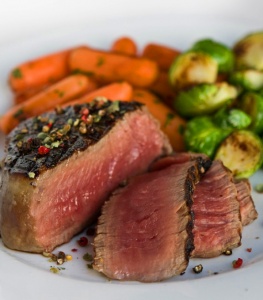 Beef Myth #5: I can't find good beef
Beef Myth #5: I can't find good beef
This reminds me a bit of my husband looking for a mysterious ingredient in the kitchen. If you continue shopping the same grocery store meat counter looking for high quality, local, pasture-raised beef, you will not find it. Remember that 99% of meat is factory-raised, so you need to get a bit creative here.
The best way to find good beef is to find a farm near you that raises healthy cows.
Here in California, there are plenty of cattle ranches that sell red meat at local farmers' markets. We love Belcampo Meat Co., Lindner Bison, and Jimenez Family Farm (for lamb and pork).
If you don't have time or access to local farms, many ranches offer direct shipping to your home.
Second best, find a health food store or small butcher, that sources the beef for you. Currently, Whole Foods in my area sells organic grass-fed beef since consumers (like you!) have been demanding it.
Note: While the label “organic” conjures up ideas of health, know that organic corn and/or grain-fed beef is not the best choice. It is more important that the cows are raised on un-sprayed pasture and eat grass and hay, NOT corn or soy. “Grass-finished” means the cattle were raised entirely on pasture and not fattened up with grain before harvest. Talk to the butcher or farmer to find out how your meat was raised.
A word on dining out: Despite the price you pay, most restaurants save cost by using conventional, factory raised meats. Unless the menu clearly states so, assume your choices for healthy meats are limited in most eateries. Here's how to eat out while being a conscious, healthy consumer.
Beef Myth #6: Grass-fed beef is too expensive
You get what you pay for. Good quality beef costs more, but the health of you and your family is absolutely worth it. With a bit of practice (and cutting out the junk) your food budget will likely even out.
Ways to stretch your red meat dollar include eating less steaks and “cheaper” cuts like ground beef and stew meats. As much as possible (limited only by availability and your comfort level), aim to eat as much as the ‘whole animal' as possible – bones make wonderful stocks for soup, and organ meats including liver and heart are super nutrient-dense.
The take home message
- Pasture-raised beef is good for you and the environment.
- Factory meat will make you sick and wreaks havoc on our planet.
- Choose good quality, and listen to your body – Eat meat when you crave it!
- If the cost is prohibitive, eat less, but always, always choose grass-fed, and preferably from a farmer you've met yourself.




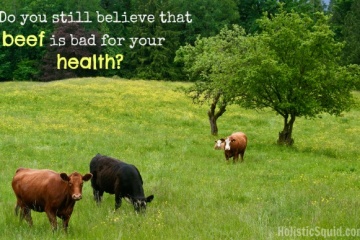
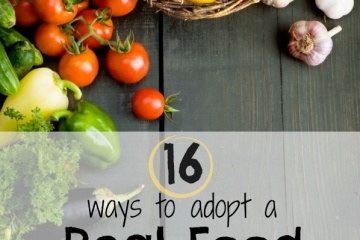


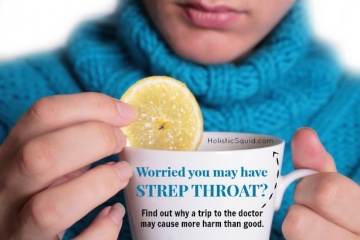
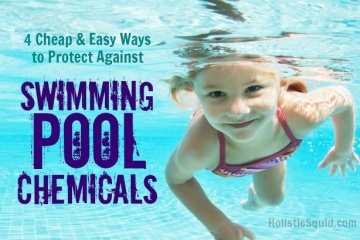
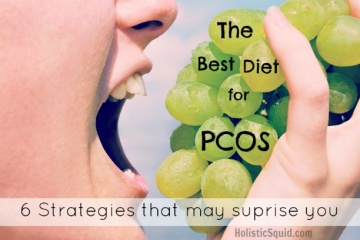

The bottom line: Pasture-raised beef is good for you and the environment. Factory meat will make you sick and wreaks havoc on our planet. Choose good quality, and listen to your body – Eat meat when you crave it!<<<<< Love it!!!!
US Wellness Meats in Missouri “a company that strives to offer only the best in grass-fed, wild-caught and free-range products!”
They ship for a meager $7.50 handling charge per order, give volume discounts and offer soy-free poultry products as well.
Thus far we’ve enjoyed their 75% lean ground beef, white sugar and nitrite-free pork bacon, soy-free whole chickens, thighs, wings and drumsticks, (plus backs and feet for broth), chicken livers, liverwurst and braunschweiger, organic free range turkey and beef tallow. Everything has been excellent but the soy-free chicken is hands down the best we’ve ever eaten.
The burger we bought when we discovered we’d eaten a whole side of beef from our own freezer and we needed to bolster our supply. I am sure all the beef is as excellent as the burger but we have had no need to try it yet.
They also offer raw dairy cheeses and Kerrygold butter. I just ordered ten pounds of Kerrygold as our source (Costco) has been out of stock the last two times we looked for it!
Also, their pork loin and shoulder roasts and nitrite-free ham were fab!
Agreed! Great article! Thanks for sharing 🙂 Just found your site and really love it.
I would believe you if you weren’t so one sided. I will be brief in every point
1) “CAFO” beef is bad for you? This is the biggest problem with the american society, media. You are correct when you say grass fed beef contains more omega-3 fatty acids. However, are these numerical differences actually physically effective? Do the math and let me know what you think.
2) Absolutely, anyone can get sick from beef, poltury, or any food. All food is contaminated with some sort of “foreign” materials be it microbes in meat, or insects in veggies, that is why we cook our food! Grass fed animals harbor ecoli just like CAFO animals do. If you are not from a farm, cook your meat, these are preventable sicknesses!
3) Look up Jude Capper, she has done alot of work on this subject.
4) Inhumane? No, comfortable animals are great for the farmer and the animals. No one goes out of their way to put extra stress on these animals.
5 & 6) These are clearly your opinion.
I am not an advocate for CAFO’s, however I wish you would present a balanced story if you chose to tell people “facts.” I think beef is great for everyone, no matter how it was raised. It’s even better that there are options for consumers to have so many options to choose from!
Hmmm, I’m gonna say that you need to do a little homework yourself there, Realist. Russia just refused to buy our beef. Coincidence, I think not. Cuz’ it’s so nutritious, I think not. Maybe you should rent King Corn. And it’s not just the omegas, also the CLA’s and many other nutrients. They are comfortable, well taken care of animals, I think not. Join PETA for a short period of time and tell me that they do not go out of their way to be cruel and that these animals are well taken care of? Oh, ignorance is bliss…So sad that there are people like you that think everything is hunky, dorey…you go ahead and keep eating you CAFO beef. Me and the Holistic Squid will continue to thrive and sleep at night on our grass fed beef, butter and cheese…
Did you know that Russia also just imported over 10,000 of our beef animals in the past few years? They are employing a social development program. They are trying to make their own food, it’s not because our meat is not nutritious.
Both you and I know your next statements are blatenly one sided.
I think we as a whole human poplulation are in err. We know farm animals are taken care of to the best of the farmers ability. They are given nutrient dense food, the ability to live without predators, and shelter. However, when we see a fellow human in fault, we tend to neglect any of their askings.
We need to rethink ourselves before we try and change others.
You can judge the motive of Russia however you want, however their stated reason for banning US beef and pork is the drug ractopamine:
“MOSCOW, Feb 11 (Reuters) – A Russian ban on U.S. beef, pork and turkey imports coming into effect this month is likely to last for a long time, Gennady Onishchenko, the head of Russia’s consumer safety watchdog, was quoted as saying by Interfax on Monday.
“Apparently the ban on practically all U.S. meat and meat products will be long term,” Onishchenko was quoted as saying.
He said the ban, announced by Russia’s Veterinary and Phyto-Sanitary Surveillance Service after it said the U.S. had failed to show the products free of growth stimulant ractopamine, would be lifted if imports came only from ractopamine-free producers.”
My goodness. I’m pleased that this blog author is promoting beef, but I do wonder why she’s so very angry. That degree of negativity must affect quality of life. So, as a scientist, let me respond to some of the claims raised. As a disclaimer, I should point out that I do love beef, all kinds of beef, and I firmly believe that there is a place for ALL beef systems that are environmentally sustainable, economically viable and socially acceptable. We should all be free to make choices as to the type of beef we buy – but let’s make sure they are informed choices. I’m simply going to bullet point my responses to avoid making this response too long.
1) The comparison between cattle eating corn and humans eating Lucky Charms is simply wrong. Cattle in feed yards eat a nutritionally-balanced diet formulated by PhD nutritionists who understand cattle digestion, metabolism and their requirements for energy, protein, vitamins and minerals. Find me a human dietician who’d recommend Lucky Charms and I’ll eat my (non-nutritious!) hat! As a side note, corn is a grass – while herbivores don’t eat meat, herbivore does not mean “pasture-eater”.
2) Feedyard cattle are not habitually “unhealthy and stressed” or subject to “discomfort”. Every cattle producer (whether corn-fed or grass-fed) knows that cattle perform best when they are healthy and free from stress. It is nobody’s best interest to have unhealthy, stressed cattle – put simply, stressed cattle means poor-quality meat. All beef producers want to make great meat!
3) Tests are in place for antibiotic residues in all meat (regardless of system) and the results are published by federal authorities. Meat containing antibiotics does NOT enter the food chain. Aside from in-feed antibiotics, cattle from grass-fed or corn-fed systems may both be treated with drugs to cure disease – it is only humane to do so.
4) All foods (save for salt and sugar) contain hormones! To imply that grass-fed beef contains no hormones and that corn-fed beef does is utterly incorrect.
5) Absolutely true that grass-fed beef contains CLA and omega-3’s. These are great nutrients – omega-3’s have anti-inflammatory properties and CLA is thought to prevent against cancer. Having said that, the quantities in beef are very small. To put it into context: you’d need to eat 42 oz of grass-fed beef to get the same amount of bioactive omega-3’s as you would get from 6 oz of salmon. All beef is a great source of protein, iron, zinc, vitamins B6 and B12 and other nutrients – let’s underline the positives rather than trying to make a mountain out of a molehill.
6) Ozone depletion is not an environmental issue associated with beef production. There are some concerns regarding the environmental impact of cattle on greenhouse gas production and climate change, however it should be noted that scientific research has shown that grass-fed beef production has a higher carbon footprint (and uses more land and water) than feed yard beef (references here: http://www.leopold.iastate.edu/sites/default/files/pubs-and-papers/2010-04-comparative-life-cycle-environmental-impacts-three-beef-production-strategies-upper-midwestern-unite.pdf and here: http://www.mdpi.com/2076-2615/2/2/127). Crop production (including fertilizers) accounts for less than 10% of corn-fed beef’s carbon footprint, whereas grass-fed cattle take longer to raise and produce more methane per day due to their grass-based diet.
I’d like to respond to a few of your bullet points:
1. Yes, PhD nutritionists formulate the feed for cattle raised in confinement, but the goal of that formula is not ‘health’ in the way we tend to think of it. The goal is fast growth of muscle and fat. If the goal of the human dietitian was to fatten up a person for slaughter, I would imagine that lucky charms might be on the menu after all. While corn is a grass, it is not a perennial grass, and most cattle were raised on perennial grass until the last century when modern machinery made grain harvest more efficient.
2. I have no major disagreement with you
3. In-feed antibiotics are the issue here. Of course cattle can be treated to cure unexpected disease, but the regular low-dosing in the feed to me indicates that there are underlying health problems with the confinement system. As Holistic Squid puts it – “Improper diet tends to create health problems for the cows, so they are often given antibiotics as a routine measure.”
4. The problem isn’t the hormones, it’s whether they are naturally occurring or added to again, stimulate faster growth.
5. True that grass-fed beef does contain fewer omega-3s than fish, but it’s still much better than grain-fed beef, and the omega 3 to omega 6 ratio is also much better. I eat a lot of beef, I’d rather not have to supplement as much with fish.
6. Carbon footprint may be less, that’s an area I need to study more and will take a look at the research you have linked.
To John’s point #4, the hormones given to promote growth are indeed natural. Estrodiol and progesterone are routinely used, the exact same ones that are already in the animals body. Synthetic hormones are used, but are derived from natural hormones, and function identically. And those synthetic hormones are routinely monitored in the aforementioned residue monitoring program to assure no additional hormone residues. Also, to Jude’s point on this, non-meat products contain substantially higher levels of hormones than beef…conventional or grass-fed. Soy has thousands of times more estrogen in it than a serving of beef…so again I think this a mountain vs. molehill situation.
Secondly, speaking in terms of “higher” and “lower” omega-3 levels is inaccurate. The CONCENTRATION of these fats in the muscle are what differ. This is important, because on average, grain fed beef has a higher amount of intramuscual fat (marbling) than grass fed…therefore in grass-fed beef, the lower amount of actual fat and higher concentration of omega-3’s balances out with the higher amount of fat and lower concentration of omega-3’s in grain fed beef. I’m really talking semantics here, but I think its an important distinction to make…especially given the broad sweeping claims that author so freely makes. And as Jude said…if you want omega-3’s, go eat fish.
On an unrelated point to these comments, the authors comments about grain fed cattle having to be “uniformly decontaminated” is 100% false. ALL slaughtered cattle are sprayed with antimicrobial interventions regardless of how/where they were raised. Regardless of grain vs. grass, there is potential for E.Coli contamination during the slaughter process. If the animal produces poop, it produces E.Coli…and therefore weak organic acids (lactic, acetic, etc) are sprayed on the exterior of the carcass to kill any potential bacteria. Ammonium hydroxide (not common cleaner ammonia…) is used in a specific process, by a specific company…so that claim too is highly inaccurate. Again, these interventions are used on ALL CARCASSES, and it not something unique to the feedlot industry. And this is simply a measure of food safety to protect the consumer. I will agree that if you are worried about this, then cook your burger to 180, and your steak to Medium Rare…but the choice of what kind of beef you buy will have no bearing on your risk for getting E.Coli poisoning…
I’ll accept your mountain out of molehill argument on the hormones, that’s not one of my big worries personally although you do admit that some of the hormones used are synthetic.
Your point about concentration of omega-3s is exactly the point I was trying to make. From everything I have read, the important health consideration is the ratio of omega 3 to omega 6, NOT the total amount of omega 3. So you may be getting the same amount of omega 3 in either grass fed or grain fed but you are getting a lot less omega 6 in the grass fed.
And about E.Coli…on a tangent from the grass-fed argument, my statistical chance of getting a contaminated hamburger is also much less if I am eating the meat from 1 cow purchased locally vs. ground beef from many cows mixed together in a large processing operation.
“but the choice of what kind of beef you buy will have no bearing on your risk for getting E.Coli poisoning…”
Beef fed high amounts of grain/corn (starch) have a much better breeding ground in their digestive systems for pathogens of all kinds because those digestive systems are designed to process grass, not starch. The ph in the first stomach is significantly different as well and that ph has everything to do with the ability for e-coli to breed. E-coli57 is an acidic loving bacteria and acidic is the environment created by starch! Grazing countries like Australia and Venezuela have never even heard of E-coli 57. Plus grazing animals naturally MOVE away from their waste while confined animals are stuck IN it.
CAFO beef are also typically fed hormones to increase their growth potential, which is a concern in itself but also contributes to unnatural growth. The corn that creates more marbling and other fat which is where the hormones store.
One more followup on #6 – the study you linked to said that it looked at average pasture systems in the upper midwest and that other pasture systems under more ideal conditions may produce different results.
“According to the metrics employed in this analysis, it would appear that feedlot-finished beef products are less resource and emissions-intensive relative to management-intensive pastured beef. We recognize, however, that in some cases there may be
substantial reductions in net greenhouse gas emissions for pasture
systems under conditions of positive soil organic carbon sequestration potential (i.e. following changes in land use, but with declining
sequestration rates over time). Furthermore, optimally-managed
pasture systems would perform better than our modelled ‘‘average” system”
I have a friend who works as a manager at a feed lot. Yes, they do buy “approved” feed but they also supplement with huge supplies of old bubble gum, candy and any other crap that food manufactures are getting rid. They do this to give them more calories to fatten them up.
To say that CAFO cows live in a healthy, non-stressed enviornment is totally false. There is nothing humane or healthy about 100’s of cows crammed into a space where they can barely move around, have no grass to graze, etc.
On your other points, John did a good job of pointing out the issues wrong with your argument.
You say Holisitic Squid is very angry. I re-read her blog and didn’t find that at all. However, your response reads as though it is coming from a government worker.
Thanks for the information, Dr. Capper. We’d also add that people can check out http://factsaboutbeef.com/ for answers to their questions about beef, animal care, nutrition and the environment.
I don’t think she sounds angry at all, just passionate and informed. I am very passionate about a lot of these issues as well and it does not make me an angry person, actually quite the opposite, because I feel I can be a voice for these animals who have non.
Here’s some scientific studies/data:
http://www.csuchico.edu/grassfedbeef/
and here’s an interview with John Wood from grasslandbeef.com:
http://www.blogtalkradio.com/undergroundwellness/2009/02/04/is-your-cow-on-grass
Where are the facts? You provide nothing to prove grass fed beef is anything but a scam. Factory farming in america is not harmful to health no matter what you believe.
And organics are a scam as well unless you grow at home in a mineral rich soil that includes all known minerals.
Myths, Distortions, and Lies About Beef
http://www.biblelife.org/beef.htm
Your website has some quite entertaining reading…like the following about 2/3 way down the beef page:
“Keeping chickens and turkeys in cages is perfectly fine. Chickens and turkeys must be the dumbest birds in the world, as those who have raised them can attest. You are also a dumb cluck if you think chickens are smart.”
WOW
Loved your article on acidic vs. alkaline foods.
That’s why I was sad to see how far you went off the rails on beef. Not criticizing grass fed stance, as all American beef (nondairy) comes off grass. But your descriptions regarding grain finished and conditions are not supported. Yes there is a slight nutrience difference – so slight FDA considers it negligible. GMO Is inconsiquential relating to either animal or nutrition.
I look forward to reading more of your articles.
Regards
Suzy